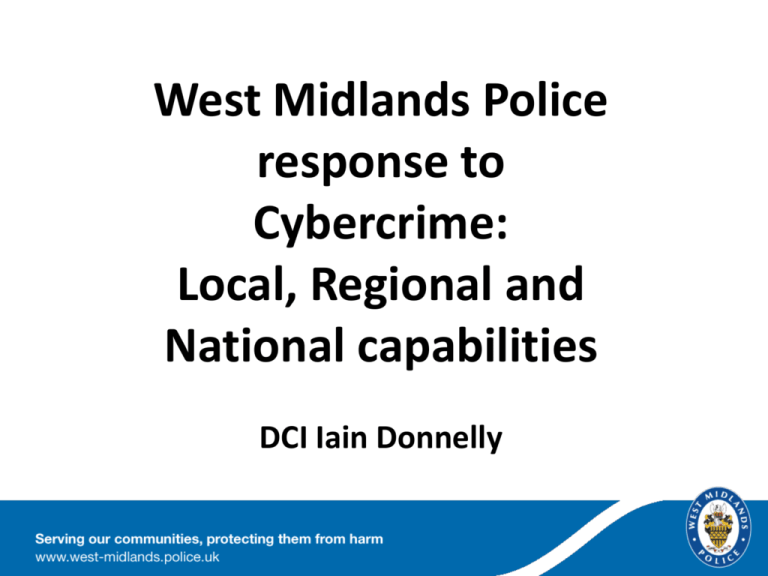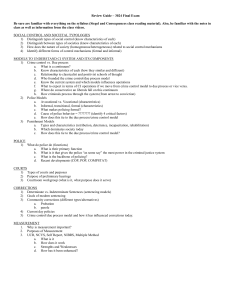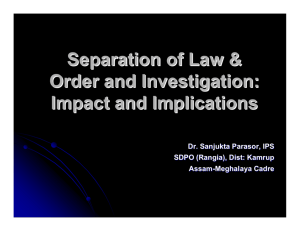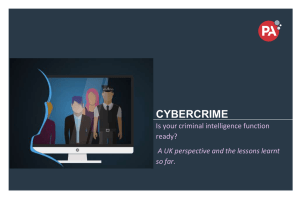WMP Cyber Crime presentation - West Midlands Police and Crime
advertisement

West Midlands Police response to Cybercrime: Local, Regional and National capabilities DCI Iain Donnelly Cybercrime? What do we mean by Cybercrime?? West Midlands Police must support victims impacted by a very wide range of criminal activities Different crime-types require different responses! What do we mean by Cybercrime? Cyber dependent: Crimes against computers E.g Remotely accessing or taking control of one or more computers to carry out a range of illegal activities Cyber enabled: Crimes which have been made possible because of computers E.g Online fraud, data theft, extortion/sextortion, online child abuse/grooming What do we mean by Cybercrime? Cyber attack: a collection of activities undertaken via computers and computer networks in order to steal money, information or damage property. This may also include “social engineering” activities to deceive or trick someone into disclosing useful information which then facilitates a technical attack on systems. West Midlands Police: The local response Force CID Investigation teams • Economic Crime Unit - responsible for financial investigation across the force, including packages received from Action Fraud in London. These will be assessed against Home Office guidelines for severity and victim impact and further investigated. • Serious and Organised Crime Unit (SOCU) – responsible for conducting covert investigations into the most serious crime, including demand led kidnap, extortion, product contamination. • FCID Priorities Team – responsible for conducting dynamic investigations into complex crime series that are likely to have a cross-border impact. • Local Investigation teams – Criminal investigation teams across each of the 10 Local Policing Units (LPUs) to investigate volume offences. West Midlands Police: The local response Public Protection Unit Investigation teams Child Abuse Investigation Teams Investigate allegations of child abuse, including online offences conducted via the internet On-line Child Sexual Exploitation Team (OCSET) Specialist investigators identifying and prosecuting sexual predators and those who make or distribute child abuse imagery. (Working in partnership with NCA/CEOP) West Midlands Police: The local response Digital media investigators – 59 detectives trained and equipped to examine most forms of electronic devices to quickly extract evidence and intelligence Digital forensics – Technical forensic specialists who will extract evidence from every type of electronic/SMART device Technical Intelligence Development Unit (TIDU) – Specialist technical investigators conducting covert online investigations Communications Data Intelligence Unit – trained and accredited to facilitate lawful acquisition of communications data and effective co-operation between West Midlands Police and communication service providers Open source investigations – 400 staff trained to obtain Intelligence and evidence from the publicly available information on the Internet The West Midlands Regional response Regional Organised Crime Unit (ROCU) • Each region has a ROCU with various capabilities • In support of the NCA and local forces each ROCU has a Cyber Crime Unit • West Midlands = 1 x DI, 2 x DS (Operational), DS (Protect) 8 x DC’s • 4 parts – Investigation/Enforcement, Intelligence, Technical, Protect & Prevent The National Cybercrime response National (NCA) Cybercrime Unit • Spread over hubs covering the UK • Support through Region to Local forces • International investigations & liaison • Close industry and academia links National 4P’s approach Pursue offenders who target the region / wider UK and its interests Prevent people becoming involved in, or remaining in, cyber crime Protect the public / organisations from becoming victims of cyber crime Prepare for the consequences when cyber incidents occur West Midlands Police advice to business 1.Prevention is always better than cure – see next section 2.Business Continuity Planning - What are your ‘crown jewels’ that need most protection. Have a plan for the most critical parts of the business that need to be protected/restored first. What does ‘recovery’ look like and how you they achieve it. Who will you turn to for assistance? 3. A live attack- In general terms it will not be the police’s responsibility to stop or mitigate most live attacks. Address this with their BC plans through IT support and service providers, however if it is something like an extortion demand then the police should be included as early as possible to maximise the opportunity to identify a suspect. 4. DDOS/Malware/Crypto locker attacks– work with your IT department to mitigate the immediate threat and refer to Action Fraud immediately. They will assess the most appropriate police response. Prevention: What can you do to protect yourself? } Excellent HM Govt resources for everyone NCA/CEOP advice to young people, parents, carers and teachers Prevention: What can you do to protect yourself? GCHQ/CESG advice to business HM Govt approved certification (From £300 to £2000) HM Govt Computer Emergency Response Team HM Govt Cyber-security Information Sharing Partnership (West Midlands launch on 11th February at JLR) Non-emergencies: 101 Emergency: 999 Website: http://www.west-midlands.police.uk/ Twitter: www.twitter.com/wmpolice Facebook: www.facebook.com/westmidlandspolice YouTube: www.youtube.com/westmidlandspolice Flickr: www.flickr.com/westmidlandspolice Action Fraud 0300 123 2040 www.actionfraud.police.uk









